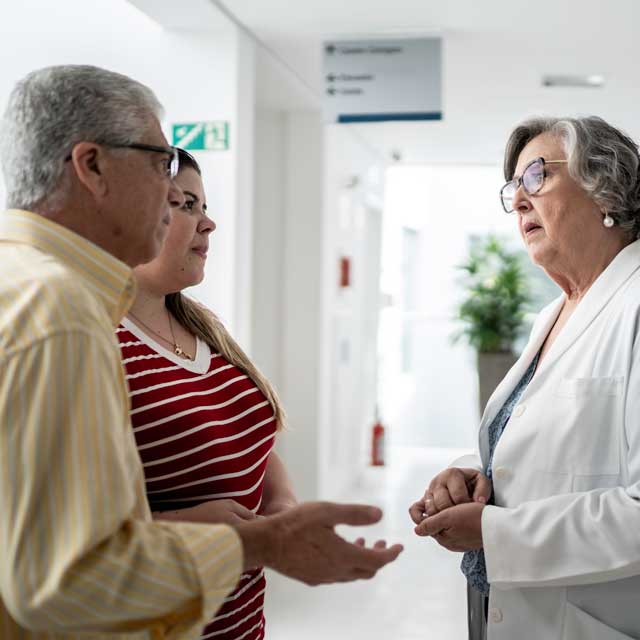A surgical procedure is part of most treatment plans for bladder cancer. Here’s what you need to know.
If you’ve been diagnosed with bladder cancer, you may be wondering about next steps, how tumors are typically removed, and what to expect going forward. Your health care team will determine what treatments make the most sense for you, depending on the size of the tumor, how invasive it is, and other factors. Surgery is usually a part of diagnosis and treatment.
One of the first steps will likely be a transurethral resection of the bladder tumor (TURBT). Most bladder tumors are cancerous, said Dr. Amy Luckenbaugh, a urologic oncology surgeon at Vanderbilt Urology. “But we don’t know for sure until we resect (cut out) that tumor,” she added. “A TURBT is required to not only treat the cancer, but also to diagnose how aggressive the cancer is.”
This type of surgery helps your medical team learn whether the cancer can be treated with medicine in the bladder or if a more aggressive surgery will be necessary.
Transurethral resection of the bladder
A transurethral resection of the bladder tumor is done through the urethra (the tube that carries urine from the bladder to the outside of your body). This procedure does not require any incisions, Luckenbaugh said. The surgeon will remove any visible part of the tumor. Patients typically go home the same day. Luckenbaugh said patients shouldn’t engage in lifting anything heavier than 10 pounds for about a week afterwards but that people usually recover well.
For some patients, this may be the only procedure necessary. However, if your surgeon suspects the tumor has grown into the lining before reaching the muscle, a repeat of the same procedure may be needed about six weeks later to confirm whether the tumor expanded.
If the tumor is large or goes particularly deep, during a surgery, the doctor may need to leave a catheter in place for a few days to let the bladder heal, Luckenbaugh added.
Partial or radical cystectomy
“If the cancer is moving into the muscle of the bladder,” Luckenbaugh said, “then we have to think about removing the bladder.”
A “partial cystectomy” removes just part of the bladder. A “radical cystectomy” removes the whole bladder. Partial cystectomies are very rarely done, because bladder cancer tends to occur in several places at once. Depending on the procedure and the type of bladder cancer reconstruction surgery you have, you may need to spend five or more days in the hospital.
“When we remove the bladder, we end up using a piece of intestine to sew the ureter tubes that normally drain the kidneys,” Luckenbaugh said. “A patient’s intestines, as result, can be slow to wake up.” After discharge from the hospital, patients should avoid heavy lifting for about six weeks. “But I really think most people don’t feel like themselves — like they did before surgery — for almost two months,” Luckenbaugh added.
You may have other treatments between your TURBT and cystectomy, as well. “Before we do surgery for muscle-invasive bladder cancer,” Luckenbaugh explained, “typically people will receive chemotherapy — as long as they have good kidney function, no hearing loss and good overall health.”
Then after the bladder cancer surgery, patients will have follow-up visits with their health care team. “We watch very closely, even after we remove the bladder,” Luckenbaugh said. Depending on the aggressiveness of the cancer, patients may need to have scans and bloodwork completed every three to six months.
Surgery for bladder cancer at Vanderbilt
Vanderbilt has the ability to perform a transurethral resection of the bladder tumor with Cysview. Cysview is a contrast solution that bladder cancer cells absorb, turning them bright pink. This procedure looks at the bladder under normal light but also a special blue light that shows the pink tissue.
“There are times that you may not see the bladder tumor under normal light,” Luckenbaugh said, “but under the special blue light, there’s a bright pink area in the bladder that is very obviously abnormal, and we then can biopsy those areas as well.”
Vanderbilt also offers clinical trials that look at treating bladder cancer with medications placed inside in the bladder, rather than removing the bladder.
Those are being studied, Luckenbaugh said. “Some of them are showing really promising results. We have that option for patients with recurrent non-invasive cancer who may be reluctant to get their bladder removed.”

Vanderbilt Health’s Urological Cancers team is dedicated to preventing, diagnosing and treating cancers that affect the kidney, bladder, prostate and testicles. The specialized team works together to provide a precise diagnosis and effective treatment options.




